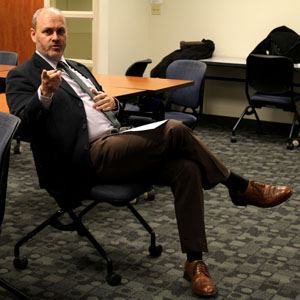Provost Diacon discusses new $440-credit-hour fee

Provost Todd Diacon speaks at the Honors College on April 11. Diacon talked about his background and answered students’ questions about the raised tuition rates. Photo by Adrianne Bastas.
April 12, 2012
New Provost Todd Diacon met with students Wednesday to discuss any questions or concerns they had about the university. It was not long before the conversation turned to the new $440 per-credit-hour fee.
“I spent the past two years at the University of Massachusetts Amherst as deputy chancellor,” Diacon said. “It might be interesting for you to know one of my official duties was to meet protesters. That’s what I’ve done for the last two years.”
He said the new fee was not meant to attack students but was a natural step to improve the university.
“What I call ‘the new normal’ — in public higher education in the United States today — is a new normal that says the state is not going to bear the cost of higher education but the users are,” Diacon said. “And you are the users.”
Diacon said the fee was necessary because the state continues to cut funding and many other public universities in Ohio have credit-hour plateau fees.
“Kent State and Ohio [University]…do something I have never seen in any other university anywhere in the country,” Diacon said. “That is, for tuition purposes, they define full time as 11 credits … At every other university that I know of, that is defined as 12 [credits].”
Diacon said that meant students at Kent State and Ohio University received two free credit hours.
Sarah Foley, sophomore integrated language arts major, said the new fee is unfair because her major “roadmap” requires her to register 18 credit hours next semester.
#KWfeeincrease
new TWTR.Widget({
version: 2,
type: ‘search’,
search: ‘#KWfeeincrease’,
interval: 6000,
subject: ”,
width: 240,
height: 300,
theme: {
shell: {
background: ‘#b8b8b8’,
color: ‘#66a9c5’
},
tweets: {
background: ‘#b8b8b8’,
color: ‘#444444’,
links: ‘#1985b5’
}
},
features: {
scrollbar: true,
loop: true,
live: true,
hashtags: true,
timestamp: true,
avatars: true,
toptweets: true,
behavior: ‘default’
}
}).render().start();
Diacon said he was going to try to work to accommodate students to the new fee, but the faculty, not the administration, decides what credits a student needs to graduate.
“We need to do a better job of communicating [with students],” Diacon said. “Clear and transparent communication is something I’m committed to.”
Aside from the new fee, Diacon discussed how he came to work as a provost.
“I never went to school thinking, ‘I’m going to become a university administrator,’” Diacon said about his first experience as an administrator at the University of Tennessee. “ I find it enormously satisfying to facilitate the success of others. Nothing was more rewarding for me.”
Diacon also discussed his college career at Southwestern University in Kansas and the University of Wisconsin.
He said he studied Central American history in college and has lived in Brazil, where he met his wife.
Without his college degree, he never would have been able to experience everything he has experienced, Diacon said.
Diacon expressed that the new fee may be expensive, but students should consider it a worthwhile investment.
“What is your degree worth?” Diacon said. “We know how much it costs — how much is it worth?”
Contact Rex Santus at [email protected].
























